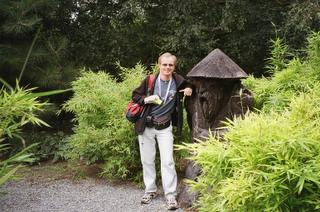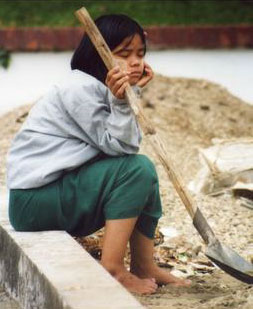A few days holiday to use and the hunt was on for a cheap
flight to a not too far distant city that I had yet to
explore. The Internet came up with a £50 flight to
Copenhagen, so I hit the buttons on the PC and the next
morning that nice little ticket came through the letterbox.
Despite being a cheapie, the Maersk flight departed Gatwick
on time and actually landed early. After collecting my bag,
it was quite a walk from the gate to the baggage area. I
bought a train ticket to Copenhagen Central Station, 25
Kroner, yep the Danes still use proper money, not silly Euro
Roubles! The efficient train takes around 15 minutes to the
city.
Next to find my hotel, the first thing to say about
accommodation in Copenhagen is it ain’t cheap. My hotel
The Cabinn was located a 10 minute walk south of the station
and cost around £50 night including a good quality
buffet breakfast. The rooms were small, but excellently
designed, though the beds are a bit narrow, I did role out
one night!
Well off to explore, first stop obviously the Tourist office.
They are extremely helpful, lots of information and maps. The
walking tours which leave from the Tourist Information at 10
am each day in the summer are excellent. They cost 75 Kroner
and take around 2 and a half hours. They are in English
explaining the city via its most famous son Hans Christian
Anderson. One tip is that you are better off doing the tour
on a week day as you can get into courtyards and see parts of
buildings not open at the weekend. You also learn gems such
as why the knee of the statue of Hans Christian Anderson is
so shiny, its because tour buses full of oriental visitors
pull up, and they sit on his knee to have their photo taken!
Nyhaven is what you see in all the postcards, a lovely area
full of sailing boats and little waterside cafes.
Another tour worth doing is the 50 minute boat trip that
leaves from Nyhaven (50 Kroner), you get a close up view of
the new Opera house and you get to see the Little Mermaid
statue from a different angle, you also get a riverside view
of the new “Black Diamond”, this love it or hate
it building is the National Library. The boat then heads into
the canals of the Christianhavns area. Christiania as the
area is known is home to an alternative community, which did
have a reputation for drugs, but has cleaned up its act to
some degree, though you can still walk down Pusher Street.
For a great view over the city it is hard to beat the climb
up the tower of the Trinity Church (20 Kroner), some great
views, but the protective fencing at the top does get in the
way of photos.
If you want to explore further afield as I did you cant beat
making the train trip to Helsingor up the coast to see
Elsinor castle, famous in Shakespear’s Hamlet, it is
expensive to enter, but the views around it are great. It was
during a wander here that the lovely sunshine disappeared and
a deluge of rain began, so I headed into Helsingor city and
visited the town's museum, which is quite interesting,
though there is little in English.
Another trip I made was west to Roskilde, this town is home
to a spectacular cathedral, but of far more interest to me
was the Viking Ship Museum (75 Kroner), there are Viking
ships, well bits of them in the museum and out on the water
are new ones built in the old way. You can walk around and
see the ships being crafted, there are areas where children
and the young at heart can try their hand at crafts from the
Viking era.
Back in Copenhagen if you want to chill out after all that
sightseeing The Rose Garden in Copenhagen’s second
biggest park, Valby Parken is the place. There are quite a
few themed gardens to wander round, number 3 has a maze and
another has a Japanese theme.

Copenhagen is perfect for a long weekend and if any of you
Globies are into Geocaching, there are around 20 to do in the
cities environs.
The Beetle had told me Copenhagen was a bit boring when she
had visited!
This is a picture of me in the Rose garden, Valby Park
Copenhagen. Beetle: where are the roses, Kev?


 As part of our
time there we went to see a local group of women rehearsing
traditional Mozambique song (see picture, left). We were
merely walking by when we were invited to sit in on the group
during practice. Listening to the women and drums as the sun
set and the tide came in really will be a lasting memory of
my time spent in East Africa. Later that day we caught a dhow
(traditional African/Arabic sail boat) from Palma all the way
back to Mikindani. This again will stay with me for the rest
of my life as one of the most authentic experiences of the
lives people lead in this part of the world. These sorts of
experiences, however overused the cliché may be,
really are priceless. Money cannot buy memories and certainly
looking at the people of Palma or Mikindani, plays no part in
happiness or generosity. This sort of journey, away from the
beaten track and reach of the guidebooks is highly
recommended and, although not to everyone’s taste, will
provide lasting memories to anyone willing to embark on
them.
As part of our
time there we went to see a local group of women rehearsing
traditional Mozambique song (see picture, left). We were
merely walking by when we were invited to sit in on the group
during practice. Listening to the women and drums as the sun
set and the tide came in really will be a lasting memory of
my time spent in East Africa. Later that day we caught a dhow
(traditional African/Arabic sail boat) from Palma all the way
back to Mikindani. This again will stay with me for the rest
of my life as one of the most authentic experiences of the
lives people lead in this part of the world. These sorts of
experiences, however overused the cliché may be,
really are priceless. Money cannot buy memories and certainly
looking at the people of Palma or Mikindani, plays no part in
happiness or generosity. This sort of journey, away from the
beaten track and reach of the guidebooks is highly
recommended and, although not to everyone’s taste, will
provide lasting memories to anyone willing to embark on
them.
 The fact is that the
call for a tourism boycott comes from Burma's elected
leaders. The National League for Democracy (NLD), who won a
landslide victory in Burma's 1990 election, remains the
only party mandated to represent the Burmese people and it is
a party that continues to draw the support and respect of
people inside and outside the country. Burma's Government
in exile, the National Coalition Government of the Union of
Burma (NCGUB), supports the boycott and it is a position that
has the backing of exile Burmese democracy groups around the
world.
The fact is that the
call for a tourism boycott comes from Burma's elected
leaders. The National League for Democracy (NLD), who won a
landslide victory in Burma's 1990 election, remains the
only party mandated to represent the Burmese people and it is
a party that continues to draw the support and respect of
people inside and outside the country. Burma's Government
in exile, the National Coalition Government of the Union of
Burma (NCGUB), supports the boycott and it is a position that
has the backing of exile Burmese democracy groups around the
world.
 The article also fails to mention
that in Burma many human rights abuses are directly connected
to the regime's drive to develop the country for
tourists. Throughout Burma men, women and children have been
forced to labour on roads, railways and tourism projects;
more than one million people have been forced out of their
homes in order to 'beautify' cities, suppress
dissent, and make way for tourism developments, such as
hotels, airports and golf courses. And these abuses are not
confined to history. In February 2004, for example, Burmese
soldiers rounded up ethnic Salons, or 'sea gypsies'
who normally live on boats in the Mergui Archipelago, forced
them to live on land and to take part in a 'Salon
Festival' aimed at foreign tourists.
The article also fails to mention
that in Burma many human rights abuses are directly connected
to the regime's drive to develop the country for
tourists. Throughout Burma men, women and children have been
forced to labour on roads, railways and tourism projects;
more than one million people have been forced out of their
homes in order to 'beautify' cities, suppress
dissent, and make way for tourism developments, such as
hotels, airports and golf courses. And these abuses are not
confined to history. In February 2004, for example, Burmese
soldiers rounded up ethnic Salons, or 'sea gypsies'
who normally live on boats in the Mergui Archipelago, forced
them to live on land and to take part in a 'Salon
Festival' aimed at foreign tourists.
 A walk around
Mikindani shows little evidence of current military activity
but the historical signs are more common. The Mtwara airstrip
was an RAF base, the customs house was destroyed by naval
artillery and subsequent neglect, the splendid hotel is a
fortified building. The Boma is no great castle but would
have been a hard nut to crack. The crenulations (saw teeth
type things you get at the top of castles) on the bastion at
the back are wide enough to accommodate the large water
cooled barrel of the Maxim machine gun whilst those on the
tower could only fit a rifle. Both employed at the time of
construction.
A walk around
Mikindani shows little evidence of current military activity
but the historical signs are more common. The Mtwara airstrip
was an RAF base, the customs house was destroyed by naval
artillery and subsequent neglect, the splendid hotel is a
fortified building. The Boma is no great castle but would
have been a hard nut to crack. The crenulations (saw teeth
type things you get at the top of castles) on the bastion at
the back are wide enough to accommodate the large water
cooled barrel of the Maxim machine gun whilst those on the
tower could only fit a rifle. Both employed at the time of
construction.